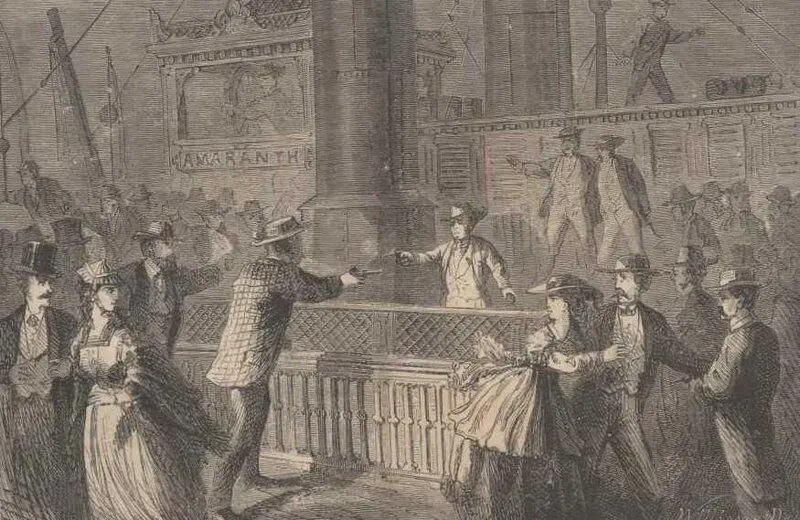Charles Warner - The Gilded Age / A tale of today
Здесь есть возможность читать онлайн «Charles Warner - The Gilded Age / A tale of today» весь текст электронной книги совершенно бесплатно (целиком полную версию без сокращений). В некоторых случаях можно слушать аудио, скачать через торрент в формате fb2 и присутствует краткое содержание. Год выпуска: 2004, Жанр: Классическая проза, на английском языке. Описание произведения, (предисловие) а так же отзывы посетителей доступны на портале библиотеки ЛибКат.
- Название:The Gilded Age / A tale of today
- Автор:
- Жанр:
- Год:2004
- ISBN:нет данных
- Рейтинг книги:3 / 5. Голосов: 1
-
Избранное:Добавить в избранное
- Отзывы:
-
Ваша оценка:
- 60
- 1
- 2
- 3
- 4
- 5
The Gilded Age / A tale of today: краткое содержание, описание и аннотация
Предлагаем к чтению аннотацию, описание, краткое содержание или предисловие (зависит от того, что написал сам автор книги «The Gilded Age / A tale of today»). Если вы не нашли необходимую информацию о книге — напишите в комментариях, мы постараемся отыскать её.
The Gilded Age / A tale of today — читать онлайн бесплатно полную книгу (весь текст) целиком
Ниже представлен текст книги, разбитый по страницам. Система сохранения места последней прочитанной страницы, позволяет с удобством читать онлайн бесплатно книгу «The Gilded Age / A tale of today», без необходимости каждый раз заново искать на чём Вы остановились. Поставьте закладку, и сможете в любой момент перейти на страницу, на которой закончили чтение.
Интервал:
Закладка:
"That's it! I thought it wasn't any slouch that was running that middle bar in Hog-eye Bend. If it's Wash Hastings—well, what he don't know about the river ain't worth knowing—a regular gold-leaf, kid-glove, diamond breastpin pilot Wash Hastings is. We won't take any tricks off of him, old man!"
"I wish I'd a stopped for him, that's all."
The Amaranth was within three hundred yards of the Boreas, and still gaining. The "old man" spoke through the tube:
"What is she-carrying now?"
"A hundred and sixty-five, sir!"
"How's your wood?"
"Pine all out-cypress half gone-eating up cotton-wood like pie!"
"Break into that rosin on the main deck-pile it in, the boat can pay for it!"
Soon the boat was plunging and quivering and screaming more madly than ever. But the Amaranth's head was almost abreast the Boreas's stern:
"How's your steam, now, Harry?"
"Hundred and eighty-two, sir!"
"Break up the casks of bacon in the forrard hold! Pile it in! Levy on that turpentine in the fantail-drench every stick of wood with it!"
The boat was a moving earthquake by this time:
"How is she now?"
"A hundred and ninety-six and still a-swelling!—water, below the middle gauge-cocks!—carrying every pound she can stand!—nigger roosting on the safety-valve!"
"Good! How's your draft?"
"Bully! Every time a nigger heaves a stick of wood into the furnace he goes out the chimney, with it!"
The Amaranth drew steadily up till her jack-staff breasted the Boreas's wheel-house—climbed along inch by inch till her chimneys breasted it—crept along, further and further, till the boats were wheel to wheel—and then they closed up with a heavy jolt and locked together tight and fast in the middle of the big river under the flooding moonlight! A roar and a hurrah went up from the crowded decks of both steamers—all hands rushed to the guards to look and shout and gesticulate—the weight careened the vessels over toward each other—officers flew hither and thither cursing and storming, trying to drive the people amidships—both captains were leaning over their railings shaking their fists, swearing and threatening—black volumes of smoke rolled up and canopied the scene,—delivering a rain of sparks upon the vessels—two pistol shots rang out, and both captains dodged unhurt and the packed masses of passengers surged back and fell apart while the shrieks of women and children soared above the intolerable din——

And then there was a booming roar, a thundering crash, and the riddled Amaranth dropped loose from her hold and drifted helplessly away!
Instantly the fire-doors of the Boreas were thrown open and the men began dashing buckets of water into the furnaces—for it would have been death and destruction to stop the engines with such a head of steam on.
As soon as possible the Boreas dropped down to the floating wreck and took off the dead, the wounded and the unhurt—at least all that could be got at, for the whole forward half of the boat was a shapeless ruin, with the great chimneys lying crossed on top of it, and underneath were a dozen victims imprisoned alive and wailing for help. While men with axes worked with might and main to free these poor fellows, the Boreas's boats went about, picking up stragglers from the river.
And now a new horror presented itself. The wreck took fire from the dismantled furnaces! Never did men work with a heartier will than did those stalwart braves with the axes. But it was of no use. The fire ate its way steadily, despising the bucket brigade that fought it. It scorched the clothes, it singed the hair of the axemen—it drove them back, foot by foot—inch by inch—they wavered, struck a final blow in the teeth of the enemy, and surrendered. And as they fell back they heard prisoned voices saying:
"Don't leave us! Don't desert us! Don't, don't do it!"
And one poor fellow said:
"I am Henry Worley, striker of the Amaranth! My mother lives in St. Louis. Tell her a lie for a poor devil's sake, please. Say I was killed in an instant and never knew what hurt me—though God knows I've neither scratch nor bruise this moment! It's hard to burn up in a coop like this with the whole wide world so near. Good-bye boys—we've all got to come to it at last, anyway!"
The Boreas stood away out of danger, and the ruined steamer went drifting down the stream an island of wreathing and climbing flame that vomited clouds of smoke from time to time, and glared more fiercely and sent its luminous tongues higher and higher after each emission. A shriek at intervals told of a captive that had met his doom. The wreck lodged upon a sandbar, and when the Boreas turned the next point on her upward journey it was still burning with scarcely abated fury.
When the boys came down into the main saloon of the Boreas, they saw a pitiful sight and heard a world of pitiful sounds. Eleven poor creatures lay dead and forty more lay moaning, or pleading or screaming, while a score of Good Samaritans moved among them doing what they could to relieve their sufferings; bathing their chinless faces and bodies with linseed oil and lime water and covering the places with bulging masses of raw cotton that gave to every face and form a dreadful and unhuman aspect.

A little wee French midshipman of fourteen lay fearfully injured, but never uttered a sound till a physician of Memphis was about to dress his hurts. Then he said:
"Can I get well? You need not be afraid to tell me."
"No—I—I am afraid you can not."
"Then do not waste your time with me—help those that can get well."
"But——"
"Help those that can get well! It is, not for me to be a girl. I carry the blood of eleven generations of soldiers in my veins!"
The physician—himself a man who had seen service in the navy in his time—touched his hat to this little hero, and passed on.
The head engineer of the Amaranth, a grand specimen of physical manhood, struggled to his feet a ghastly spectacle and strode toward his brother, the second engineer, who was unhurt. He said:
"You were on watch. You were boss. You would not listen to me when I begged you to reduce your steam. Take that!—take it to my wife and tell her it comes from me by the hand of my murderer! Take it—and take my curse with it to blister your heart a hundred years—and may you live so long!"
And he tore a ring from his finger, stripping flesh and skin with it, threw it down and fell dead!
But these things must not be dwelt upon. The Boreas landed her dreadful cargo at the next large town and delivered it over to a multitude of eager hands and warm southern hearts—a cargo amounting by this time to 39 wounded persons and 22 dead bodies. And with these she delivered a list of 96 missing persons that had drowned or otherwise perished at the scene of the disaster.
A jury of inquest was impaneled, and after due deliberation and inquiry they returned the inevitable American verdict which has been so familiar to our ears all the days of our lives—"NOBODY TO BLAME."
**[The incidents of the explosion are not invented. They happened just as they are told.—The Authors.]
CHAPTER V.
Adoption of the Little Girl Laura—Arrival at Missouri—Reception by Colonel Beriah Sellers
Il veut faire secher de la neige au four et la vendre pour du sel blanc.
When the Boreas backed away from the land to continue her voyage up the river, the Hawkinses were richer by twenty-four hours of experience in the contemplation of human suffering and in learning through honest hard work how to relieve it. And they were richer in another way also. In the early turmoil an hour after the explosion, a little black-eyed girl of five years, frightened and crying bitterly, was struggling through the throng in the Boreas' saloon calling her mother and father, but no one answered. Something in the face of Mr. Hawkins attracted her and she came and looked up at him; was satisfied, and took refuge with him. He petted her, listened to her troubles, and said he would find her friends for her. Then he put her in a state-room with his children and told them to be kind to her (the adults of his party were all busy with the wounded) and straightway began his search.
Читать дальшеИнтервал:
Закладка:
Похожие книги на «The Gilded Age / A tale of today»
Представляем Вашему вниманию похожие книги на «The Gilded Age / A tale of today» списком для выбора. Мы отобрали схожую по названию и смыслу литературу в надежде предоставить читателям больше вариантов отыскать новые, интересные, ещё непрочитанные произведения.
Обсуждение, отзывы о книге «The Gilded Age / A tale of today» и просто собственные мнения читателей. Оставьте ваши комментарии, напишите, что Вы думаете о произведении, его смысле или главных героях. Укажите что конкретно понравилось, а что нет, и почему Вы так считаете.












